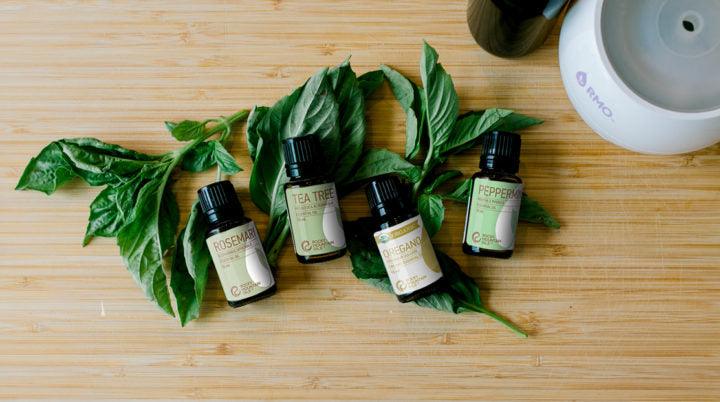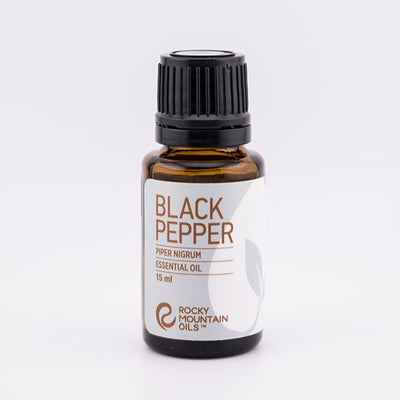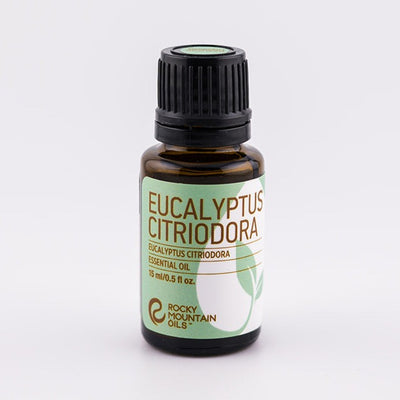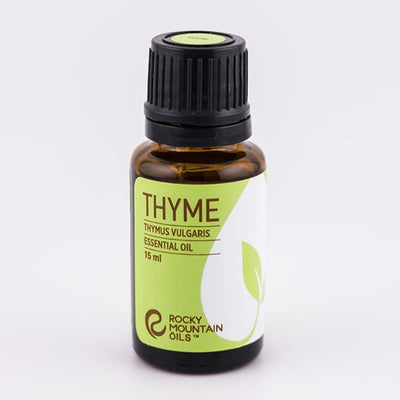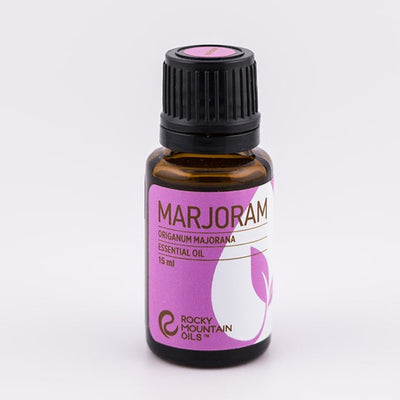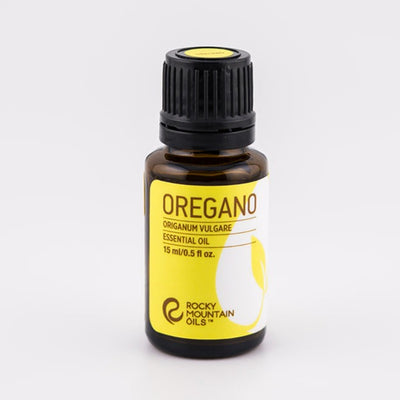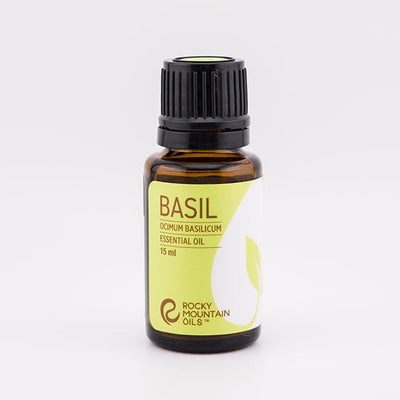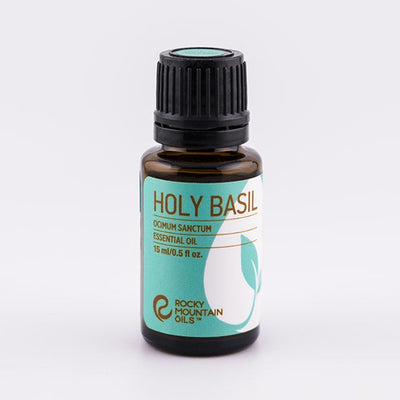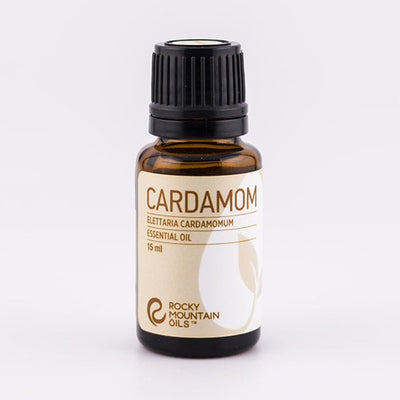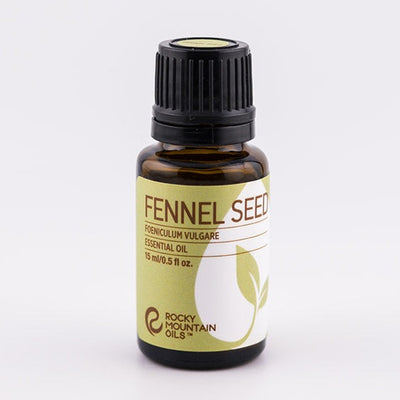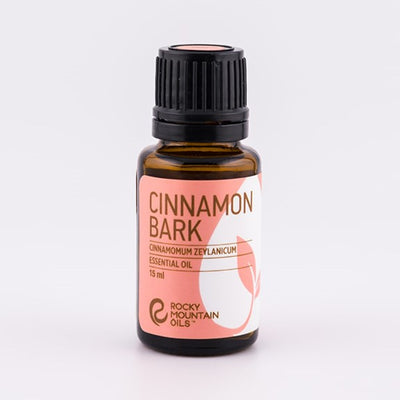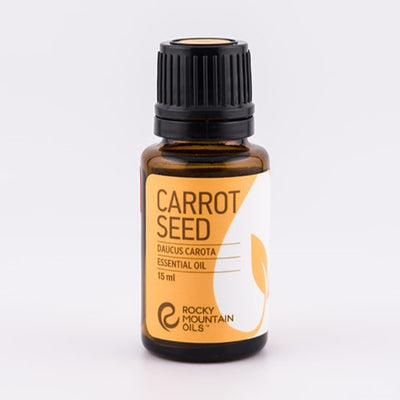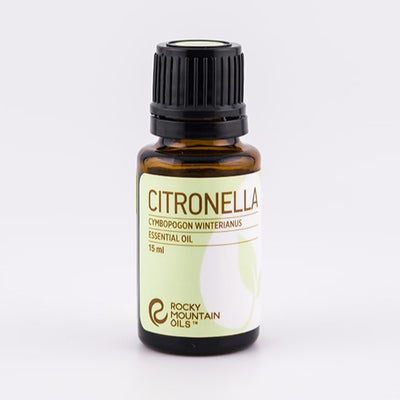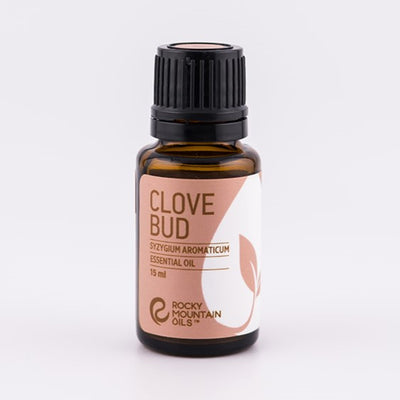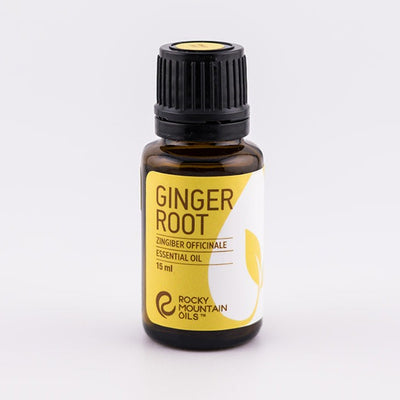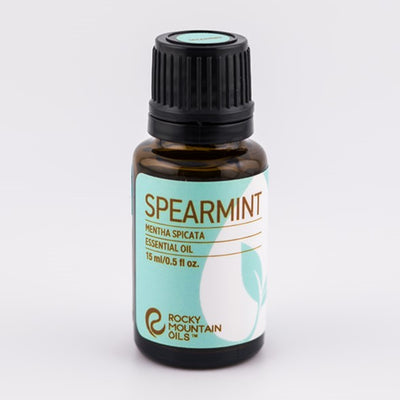Herb Essential Oil Alternatives to Love: Substitute for Rosemary
Don’t miss out on the spicy and herbal aromas in your blends!
Experience the scent of the fresh outdoors with these herb oil substitutes.
There are a lot of excellent essential oils out there that come from common herb and spice plants. You may be familiar with many of these spices in your kitchen, but their essential oils also pack a powerful health-boosting punch! If you have an essential oil recipe or are looking to experience the benefits of a specific oil that you don't have in your collection, don't fret! These herb essential oil substitutes are the perfect alternatives for your favorite spicy or herbal essential oil.
Easy Spice and Herb Essential Oil Substitutes
There are a host of herb and spice essential oils that provide excellent benefits, but some of these oils may be less familiar than others. Keep in mind that no two oils are the same. Many oils will have similar aromas and benefits as others, but they will not be identical. It's important to also note that the substitutions listed here are not inclusive, and there may be other oils you can use as a substitute.
Rosemary
Rosemary Aromatic Substitutes: We are all likely familiar with the smell of fresh rosemary. This herb's essential oil is similar, offering a strong herbaceous and slightly woody aroma. For those times when you need Rosemary but don't have any, Eucalyptus oil is a great substitute for Rosemary essential oil.
Hair Health: Rosemary oil makes a great hair tonic that can naturally help thicken and grow hair. For those who have itchy scalps, Rosemary can also help ease discomfort and provide relief. If you don't happen to have Rosemary, use Peppermint, Geranium, or Clary Sage for similar benefits.
Memory Boost: One of Rosemary's top benefits is boosting overall memory performance. Rosemary can help memory recall, alertness, and help protect against memory loss. To give your memory a boost you can try Sage as a substitute for Rosemary essential oil. Black Pepper and Basil are also great substitutes for Rosemary essential oil.
Black Pepper
Black Pepper Aromatic Substitutes: This fabulous oil offers a spicy, warm, and invigorating aroma that is great for many recipes. If you find yourself in need of Black Pepper but don't have a bottle, Sage can be a great substitute for Black Pepper essential oil.
Aches and Pains: Black Pepper's anti-inflammatory properties and warming effect is great for soothing sore and achy muscles or joints. If you don't have Black Pepper but have aches and pains you want to soothe, Rosemary can be a versatile substitute for Black Pepper essential oil. Turmeric and Peppermint also make great Black Pepper substitutes.
Digestion Aid: This spicy oil is great at supporting healthy digestion. Black Pepper can help with digestive regularity while also reducing bloating and other uncomfortable tummy issues. If you don't have Black Pepper, you can try Ginger as a substitute for Black Pepper essential oil.
Body Detox: Black Pepper's stimulating effect can help your body naturally establish and maintain balance, particularly with blood pressure and glucose levels. By establishing balance and helping to reduce inflammation, Black Pepper aids your body's natural detox process. If you don't have Black Pepper, try using Myrtle, Lemon, or Frankincense.
Eucalyptus
Eucalyptus Aromatic Substitutes: A fan favorite, Eucalyptus oil is very popular among essential oil lovers, and for good reason! However, if you need this fresh, menthol-like aroma but don't have it in your collection, Tea Tree is extremely close substitute for Eucalyptus oil.
Respiratory Health: One of Eucalyptus' most well-known benefits is supporting respiratory health. From soothing coughs and clearing congestion to easing sore throats and boosting your immune system, Eucalyptus is what you need for the cold and flu season. If you don't have Eucalyptus, try Rosemary as a substitute for Eucalyptus oil. Peppermint, Frankincense, and Oregano also have similar benefits to Eucalyptus .
Allergy Relief: Seasonal allergies can cause a host of uncomfortable symptoms, including stuffy nose, scratch throat, and watery eyes. If you experience these or other symptoms, Eucalyptus can help you find relief. However, if you don't have Eucalyptus, Lavender works as a versatile substitute for Eucalyptus oil. Peppermint is also another Eucalyptus oil substitute that can help with allergies.
Thyme
Thyme Aromatic Substitutes: A must have, Thyme is an incredible essential oil that offers a strong herbaceous aroma. For those times when you need Thyme but don't have a bottle, you can get a similar smell from Sweet Marjoram, Oregano, or Rosemary.
Respiratory Health: Feeling stuffy? Thyme is an expectorant, supporting your body's natural ability to reduce congestion and clear your airways. If you need a natural expectorant but don't have Thyme in your collection, Eucalyptus or Rosemary make excellent substitutes.
Germ Buster: Thyme oil is naturally antibacterial and antiseptic. This means it can support your body's ability to fight off germs while also helping to keep the air and surfaces in your home germ-free. For similar benefits, you can always use Tea Tree, Lemon, or Cinnamon Bark if you don't have Thyme.
Bug Repellent: Don't let pesky bugs interfere with your outdoor adventures or life at home. Thyme can help repel a variety of bugs, including mosquitoes, bed bugs, beetles, and fleas. If you don't have Thyme but need to keep some bugs away, Lemongrass and Citronella work great!
Sage
Sage Aromatic Substitutes: This herbal oil gives a warm, spicy, fresh aroma that many of us love. However, if you don't have Sage in your collection and need an oil that smells similar, try using Rosemary or Eucalyptus.
Immune Boost: Sage essential oil has natural antifungal, antibacterial, and antimicrobial properties that can help keep the germs away and your immune system up. If you're looking to boost your immune system but don't have Sage, don't worry! You can help protect yourself with Oregano, Lemon, or Frankincense.
Household Cleaner: Because of its powerful germ-fighting properties, Sage is an excellent oil to add to your natural cleaners. If you don't have Sage, you can still clean your home naturally by using Tea Tree, Lemon, or Cinnamon Bark.
Skin Care: Sage oil is great for your skin, especially when it comes to reducing the appearance of scars, stretch marks, or blemishes. If you don't have Sage to add to your skincare routine, you can substitute it with Lavender, Neroli, or Jasmine for similar benefits.
Tea Tree
Tea Tree Aromatic Substitutes: This familiar oil is a favorite for many people and offers a very distinct smell. However, if you don't have a bottle of Tea Tree or are waiting for your next bottle to arrive, you can use Eucalyptus as a Tea Tree oil substitute. Cajeput and Myrtle also have similar aromas.
Acne Buster: With its natural antibacterial properties, Tea Tree oil is well-known for its ability to soothe pimples and help prevent future breakouts. If you don't have the Tea Tree to add to your skincare routine, you can try Sandalwood as a Tea Tree oil substitute to help treat existing acne. Lavender is also a great substitute for Tea Tree oil to help heal scars left behind from acne.
Hair Care: Tea Tree is great for relieving an itchy, dry scalp. It can also help reduce greasiness and fight against head lice. If you're looking to step up your hair care game but don't have Tea Tree, try using Frankincense, Geranium, or Peppermint for your scalp. You can also use Lavender, Rosemary, or Eucalyptus to help fight against lice.
Household Cleaner: With natural antimicrobial, antiseptic, antibacterial, antiviral, and antifungal properties, Tea Tree is the perfect household cleaner to get rid of germs and help you stay healthy. For those times you don't have Tea Tree, you can use Lemon or Eucalyptus. Cinnamon Bark is also a great Tea Tree oil substitute for cleaning.
Sweet Marjoram
Sweet Marjoram Aromatic Substitutes: Marjoram may be a little less familiar of an oil some people, but its aroma is close to many of its herbal oil friends. If you're looking for an oil that smells similar to Sweet Marjoram, try using Thyme or Fennel.
Hormonal Balance: Imbalanced hormones can cause a variety of issues, particularly for women and their menstrual cycle. Sweet Marjoram supports your body's natural ability to balance hormones and ease symptoms related to imbalance. However, if you don't have Sweet Marjoram, you can always substitute it with Clary Sage, Thyme, or Sandalwood.
Aches and Pains: Do you experience frequent headaches, or do you have sore or tight muscles? Sweet Marjoram is soothing and can help loosen tension and ease associated aches. If you're looking for relief but don't have Sweet Marjoram, try using Peppermint, Ginger, or Rosemary instead.
Oregano
Oregano Aromatic Substitutes: A familiar spice for the kitchen, Oregano is an essential oil that offers a warm, spicy, and herbaceous aroma. However, if you need to replace Oregano in a recipe, you can use Marjoram, Tea Tree, or Cajeput for a similar aroma.
Kills Germs: Oregano oil has natural powerful germ-killing properties that can help protect your body from unwanted illness. Use Oregano to strengthen your body's immune response to fight against colds, the flu, and other sickness. If you don't have Oregano to boost your immune system, try using Lavender, Clove Bud, or Frankincense.
Respiratory Health: Feeling stuffy? Oregano is a natural expectorant that can help clear congestion while also soothing a cough and sore throat. If you need some help clearing your airways but don't have Oregano, try using Eucalyptus or Rosemary instead.
Inflammation: If you have achy joints or sore muscles, Oregano can help loosen up your muscles and bring the relief you need. For some times when you don't have a bottle of Oregano, substitute it with Lavender, Lemon, or Turmeric.
Basil
Basil Aromatic Substitutes: You may be familiar with the incredible aroma of fresh basil; its oil isn't much different. If you need a substitute for Basil's spicy, sharp, and almost licorice-like aroma, Holy Basil is the best option. You can also try using Coriander or Rosemary.
Immune Boost: Basil oil has powerful natural antibacterial properties that can help keep your immune system strong. Use Basil in your natural cleaners to disinfect surfaces, or diffuse to purify the air and protect yourself from unwanted germs. Don't have Basil? Try using Tea Tree, Lemon, or Lavender instead.
Muscle Tension: Got sore muscles? Basil's anti-inflammatory properties make it great for easing tension and providing immediate relief. For those times you don't have Basil oil you can ease your sore muscles with Peppermint, Lavender, or Rosemary.
Digestion Aid: Basil oil is great for stimulating your body's natural digestion process. This makes it particularly good at aiding in constipation relief. If you need help promoting digestion but don't have Basil, some excellent replacements are Ginger or Fennel.
Stress Relief: Does life have you feeling like you want to pull your hair out sometimes? For those times when you feel particularly anxious, fearful, or nervous, Basil can help calm racing thoughts and any associated headaches. If you don't have Basil, try using Lavender or Chamomile to calm your mind.
Holy Basil
Holy Basil Aromatic Substitutes: As Basil oil's royal cousin, Holy Basil has a strong, deep, warm scent. As similar plants, Basil makes a great substitution for Holy Basil's aroma and most therapeutic benefits. However, if you don't have Holy Basil or Basil, you can try using Coriander, Rosemary, Eucalyptus, or Lemongrass for a similar aroma.
Memory Boost: Holy Basil is naturally high in cineole, which can help regulate hormones in the brain and improve memory and clarity. If you need help protecting against reduced memory or with memory recall, Rosemary is an excellent substitute for when you don't have Holy Basil.
Muscle Cramps: From working out to the side effects of woman's monthly visit from Mother Nature, we can experience a variety of muscle cramps. Holy Basil can help soothe muscle tension and relieve cramps, headaches, and spasms. If you don't have Holy Basil, try using Clary Sage for menstrual cramps in particular. For other muscle cramps, try Peppermint or Helichrysum.
Cardamom
Cardamom Aromatic Substitutes: As one of the oldest spices known to man Cardamom offers a warm, spicy-sweet aroma. If you have a recipe that calls for Cardamom but don't have a bottle, Petitgrain is close in aroma.
Cough Suppressor: Cardamom oil is great at soothing respiratory spasms, particularly those that lead to coughs or other respiratory issues. If you need help soothing a cough but don't have Cardamom, try using Eucalyptus, Rosemary, or Oregano instead.
Digestion Aid: Cardamom oil is well-known for its ability to support your entire digestive system. If promotes proper function while also aiding in protecting your digestive system from illness. For those times when you want to support proper digestion, you can always use Ginger or Coriander instead of Cardamom.
Metabolism Boost: Looking to support a healthy metabolism? Cardamom can help! Cardamom oil stimulates the secretion of various enzymes, helping your body to naturally maintain a healthy metabolism. If you don't have Cardamom, however, Grapefruit and Rosemary can provide similar benefits.
Fennel
Fennel Aromatic Substitutes: Although it may be a little less familiar to some people, Fennel is a classic. If you don't have a bottle of Fennel for a recipe, you can substitute it with Angelica Seed, Dill, Coriander, or Thyme for a similar aroma.
Digestion Aid: One of Fennel's most well-known benefits is as a digestive aid. Fennel oil is particularly good for promoting digestion and relieving a variety of uncomfortable digestive symptoms, such as bloating, indigestion, and irregularity. If you don't have Fennel but want to support your digestive system, try using Basil, Coriander, or Peppermint instead.
Menstruation Relief: For you ladies out there, you know the uncomfortable symptoms that come from your monthly menstruation cycle. Whether you experience cramps, headaches, mood swings, or dizziness, Fennel can help relieve your symptoms. If you don't have Fennel but need some relief, try Clary Sage or Holy Basil.
Stress and Anxiety: If you experience feelings of high stress or anxiety, Fennel can help you relax. Fennel can also improve mental clarity to help you not overthink things. For those times when you need help collection your thoughts and relaxing but don't have Fennel, you can use Lavender, Lemon, or Basil for similar benefits.
Cajeput
Cajeput Aromatic Substitutes: The Cajeput essential oil offers some excellent benefits, but it is also an oil that is unfamiliar to many people. If you have a recipe that calls for Cajeput but don't have any, you can use Tea Tree or Eucalyptus in its place for a similar aroma.
Immune Boost: Cajeput packs a powerful punch when it comes to fighting against germs! It naturally helps your body fight against bacteria, viruses, and fungi so that you can stay healthy. If you don't have Cajeput, you can use Cinnamon Bark or Thyme to still get that immune boost.
Insect Repellent: Trying to keep insects out of your home and away from your outdoor adventures? Cajeput is great at keeping the pests away! However, if you don't have Cajeput but still want to avoid bugs, try using Lemongrass or Peppermint instead!
Congestion: If a stuffy nose is keeping you from enjoying your day, Cajeput can help dispel congestion and open your airways. But, if you don't have Cajeput in your collection, Eucalyptus and Peppermint are excellent replacements.
Cinnamon Bark
Cinnamon Bark Aromatic Substitutes: A fan favorite, Cinnamon Bark offers a warm and spicy scent that many of us love. If you're looking for that familiar scent in another oil, try using Black Pepper, Clove Bud, or Nutmeg.
Aphrodisiac: Cinnamon Bark is great for creating a romantic atmosphere and boosting passion. This spicy oil is also great for helping with impotence and frigidity. If you don't have Cinnamon Bark, you can use Patchouli or Ylang Ylang as an alternative.
Reduce Cravings: Trying to stick to a diet or maintain a healthy weight? Cinnamon Bark can help regulate blood sugar, which can help reduce sugar cravings, fatigue, and overeating. For those times when you don't have Cinnamon Bark, try using Peppermint or Ginger instead.
Inflammation: Cinnamon Bark's warming effect can work wonders on inflammation. From red and inflamed skin to muscle soreness, Cinnamon Bark can help. If you don't have Cinnamon Bark, try using Sweet Marjoram, Lavender, or Peppermint for sore muscles. If you have an inflamed skin irritation, Chamomile and Clary Sage are great replacements.
Turmeric
Turmeric Aromatic Substitutes: This brightly colored spice offers an essential oil with a fresh, spicy aroma very similar to that of Ginger. Because of its similarities, Ginger oil is a great substitute for Turmeric's aroma. If you're looking for other options, you can also try Coriander or Cumin.
Joint Inflammation: Turmeric is well-known for its anti-inflammatory properties, and its essential oil provides the same benefits, particularly when it comes to joint pain or stiffness. If you're trying to loosen up your joints but don't have Turmeric, you can try Frankincense, Copaiba, or Ginger for similar effects.
Skin Care: Because of its anti-inflammatory and antibacterial properties, Turmeric is great at fighting the bacteria that cause acne and the inflammation that can come from breakouts. Not only that, but Turmeric can help even out your skin tone and promote a glowing complexion. For those times you don't have Turmeric but want similar benefits, Rose, Carrot Seed, and Geranium are excellent substitutes.
Carrot Seed
Carrot Seed Aromatic Substitutes: Although not as commonly known, Carrot Seed essential oil offers a unique aroma that is both sweet and earthy. If your recipe calls for Carrot Seed but you don't have a bottle of your own, Petitgrain, Ginger, Cardamom, or Davana have similar aromas.
Hair and Skin Health: Carrot Seed oil is extremely moisturized for both hair and skin. Its high antioxidant count also makes it great for protecting against free radicals and signs of aging. If you don't have Carrot Seed, try using Lavender for both your hair and skin. Peppermint, Rosemary, and Cedarwood are also good for your hair, and Chamomile is great for the skin.
Antioxidant Boost: Carrot Seed is extremely high in antioxidants, which makes it great for helping your body to fight off free radicals and cell damage. This can also help boost your immune system to fight against germs and illness. If you need an antioxidant boost but don't have Carrot Seed, try using Turmeric, Sweet Marjoram, Helichrysum, or Clove Bud instead.
Citronella
Citronella Aromatic Substitutes: This familiar oil has a fresh, sweet, and slightly lemony aroma. If you're in need of Citronella but don't have a bottle on hand, Lemongrass offers a very similar aroma that you can use in your recipes.
Bug Repellent: Citronella is well-known as a natural bug repellent. This oil can work wonders to keep mosquitoes, lice, and other bugs out of the house and away from you during outdoor adventures. If you want a natural bug repellent but don't have Citronella, don't worry! Lemongrass and Cedarwood can keep the bugs away, too.
Reduce Stress: With its lemony aroma, Citronella can help to both relax and uplift the mind. Its pleasing aroma can invigorate the mind, recall pleasant memories, and aid in better sleep. For those times when you don't have Citronella but need help relaxing, Lavender and Bergamot can help.
Household Cleaner: Citronella naturally has strong antibacterial and antifungal properties, which makes it great as a household cleaner! If you're looking to clean your home naturally but don't have Citronella, that's okay! Tea Tree and Lemon are excellent substitutes.
Clove Bud
Clove Bud Aromatic Substitutes: A classic spice, Clove Bud has a familiar spicy aroma that many of us love during the fall season. If you've got a recipe that calls for Clove Bud but you don't have a bottle in your collection, Cinnamon Bark, Ginger, and Nutmeg offer similar spicy aromas.
Skin Care: Clove Bud has powerful antibacterial properties that can help fight against the bacteria that cause acne. For those who don't have Clove Bud but are looking to help reduce existing acne or future breakouts, Tea Tree, Juniper Berry, and Clary Sage are good replacements.
Immune Boost: Not only is Clove Bud antibacterial, but it is also antiviral and high in antioxidants, which makes it a great oil to help boost your body's natural immune defenses against germs and illness. To give your immune system a boost, you can always use Lemon, Basil, Nutmeg, or Myrrh as a substitute if you don't have Clove Bud.
Lemongrass
Lemongrass Aromatic Substitutes: This herbal, grassy oil has a slightly lemony aroma that many people love. However, if you don't have Lemongrass, Citronella offers a very similar aroma that you can use as a replacement.
Deodorizer: With its light, lemony fresh aroma, Lemongrass can help eliminate nasty odors around the home while also sanitizing the air and helping to eliminate germs. However, if you don't have Lemongrass, you can use Clove Bud or Eucalyptus to help reduce odors with clean air.
Skin and Hair Health: Lemongrass has natural antiseptic and astringent properties that can work as a natural cleanser for all skin types. It also helps bring out your natural glow and tone the skin. Lemongrass can also help soothe an itchy scalp and add some shine to your hair. If you don't have Lemongrass, try using Lavender for your skin, Chamomile for your hair, or Ylang Ylang for both!
Insect Repellent: Keep bugs out of your home and away from your outdoor adventures with Lemongrass! While we enjoy the lemony scent of this oil, the bugs do not. If you've got pests around that you need to get rid of but don't have Lemongrass, you can always use Citronella or Basil instead.
Coriander
Coriander Aromatic Substitutes: This herbal oil offers a sweet yet spicy, woody, and slightly balsamic aroma. With such a unique smell, it can seem difficult to find a substitute. However, Dill and Cardamom are really quite close for those times when you don't have Coriander!
Hair and Skin Health: Like many other herbal oils, Coriander is high in antioxidants, which can help protect against free radicals and signs of aging. As a result, Coriander can help reduce age spots, fine lines, and wrinkles. For those looking to keep youthful skin but don't have Coriander, you can substitute it with Frankincense, Rose, Sandalwood, or Lemon.
Digestion Aid: Coriander is known for its ability to support proper digestion within the body. If you struggle with digestive problems or uncomfortable symptoms, try using Coriander. If you don't have Coriander, some good substitutes are Fennel, Cardamom, and Ginger.
Ginger Root
Ginger Root Aromatic Substitutes: Most of us are familiar with the benefits and smell of fresh ginger, but Ginger oil can be just as beneficial. If you are looking for a substitute for Ginger oil, Nutmeg, Cinnamon Bark, and Davana offer similar aromas.
Digestion Aid: Perhaps Ginger's most well-known benefit is as a digestive aid. Whether you have indigestion, irregularity, nausea, or stomach aches, Ginger oil can help calm the stomach and promote proper digestion. If you don't have Ginger, however, Peppermint and Fennel make excellent alternatives.
Respiratory Health: Colds, the flu, and other illnesses can lead to stubborn coughs and congestion. With Ginger oil, you can experience clearer airways and a suppressed cough. If you have respiratory symptoms disrupting your life but don't have Ginger, try using Eucalyptus or Rosemary instead.
Inflammation: Ginger's warming effect can help soothe sore muscles or joints. If you experience frequent stiffness or aches but don't have Ginger oil to help, Turmeric and Cinnamon Bark are excellent substitutes.
Aphrodisiac: With its spicy scent and warming effect, Ginger can help relieve stress and self-doubt in the bedroom. It can also boost libido and help with impotence. For those times when you need help setting a romantic mood but don't have Ginger, try using Ylang Ylang, Cinnamon Bark, Clove, or Nutmeg instead.
Cornmint
Cornmint Aromatic Substitutes: Like its minty cousins, Cornmint offers a familiar minty aroma with a warm and herbaceous overtone. For those times when a recipe calls for Cornmint but you don't have a bottle, Peppermint and Spearmint are good substitutes.
Cold Relief: Cornmint's cooling and soothing effect can help ease symptoms of a cold. From coughs to headaches caused from congestion or stress, Cornmint can help you find relief. If you don't happen to have Cornmint in your collection, Peppermint and Eucalyptus are good alternatives.
Stress Relief: Cornmint's minty aroma can help stimulate the mind and ease feelings of stress or anxiety. If you're feeling wound up and need help relaxing but don't have Cornmint, try using Frankincense, Lavender, or Bergamot instead.
Davana
Davana Aromatic Substitutes: A highly sought after oil, Davana is an oil that many people love. It offers a distinct aroma that adjusts as it touches the skin to be unique to the wearer. If you need Davana for its smell but don't have a bottle, Petitgrain and Ginger offer close aromas.
Stress Relief: Davana has powerful relaxation benefits, helping to induce feelings of peace and positivity while reducing those of disappointment or nervousness. If you do not have Davana but need help relaxing, Ginger, Lavender, or Bergamot can provide similar benefits.
Disinfectant: Davana is naturally powerful in fighting a variety of germs, including bacteria, microbes, fungi, and viruses. If you need help keeping your clean home and free of germs, adding Davana to your cleaner can help. For those times when you don't have Davana, try using Lemon, Lemongrass, Clove, or Peppermint instead.
Menstruation Aid: When women experience their monthly period, they can experience a variety of uncomfortable side effects, including cramps, nausea, and fatigue. Davana can help ease the side effects of a woman's monthly cycle; however, if you don't have Davana, Clary Sage is another oil well-known for such benefits.
Peppermint
Peppermint Aromatic Substitutes: A must-have, Peppermint oil offers that familiar, crisp, minty aroma that we all love; however, if you don't have any Peppermint left in your collection, that's okay! You can get a similar minty aroma with Spearmint or Wintergreen, and even Eucalyptus.
Muscle Aches: Perhaps Peppermint's most well-known benefit is to ease achy or sore muscles. Its cooling effect helps release tension and brings a soothing relief. However, if you've run out of Peppermint, you can still find relief by using Rosemary or Ginger.
Energy Boost: Peppermint's crisp, sharp, and minty aroma does wonders to help wake up the mind and body. Whether you're looking to boost your focus, wake up in the morning, or bump up your exercise performance, Peppermint can help. If you don't have Peppermint, try using Orange, Spearmint, or Lemon for similar benefits.
Digestion Aid: Another popular benefit of Peppermint is its ability to support proper digestion and ease uncomfortable tummy issues. Peppermint oil is particularly good at easing stomach cramps or bloating. If you're looking to support your digestive system but don't have Peppermint, you can substitute it with Ginger or Fennel.
Petitgrain
Petitgrain Aromatic Substitutes: A versatile oil, Petitgrain essential oil has a sweeter aroma with subtle hints of wood. For those times when you don't have Petitgrain and need an oil with a similar smell, try using Neroli or Orange.
Mood Booster: Petitgrain is an excellent oil for relaxation. It can also help stabilize the mood and emotions, calming anxiety and feelings of grief while also working to enhance concentration and fight fatigue. If you need relaxing and focusing, Rosemary and Bergamot are good replacements if you don't have Petitgrain in your collection.
Muscle Aches: Got sore muscles? Petitgrain oil can help to both soothe tight muscles and ease muscle spasms you may experience. If you're sore but don't have Petitgrain, don't worry! You can still find relief from Peppermint, Chamomile, or Rosemary oil.
Skin Care: Petitgrain is great for the skin. It works particularly well on sensitive skin, and it can help even out your skin tone while fighting acne and reducing blemishes. If you don't have Petitgrain to add to your skincare routine, try using Lavender or Cedarwood instead.
Myrtle
Myrtle Aromatic Substitutes: With its many benefits, Myrtle is an excellent essential oil very similar to Tea Tree. Because of this, Tea Tree makes a great aromatic substitute if you don't have Myrtle on hand. Another great oil substitute with a similar aroma is Cajeput.
Congestion Relief: Is a stuffy nose keeping you from breathing properly? Myrtle can help remove excess mucus and relieve congestion so that you can breathe better. For those times when you're stuff but don't have Myrtle, try using Eucalyptus or Rosemary instead.
Skin Care: Myrtle is naturally high in antioxidants, which means it can help fight free radicals and signs of aging. Myrtle can help clear up acne and blemishes while reducing other skin irritations. If you don't have Myrtle to add to your skincare routine, you can try using Geranium or Chamomile.
Brain Boost: If you are looking to boost your memory and clarify your mind, Myrtle can help. If you don't have Myrtle in your collection, try using Peppermint or Rosemary in its place.
Nutmeg
Nutmeg Aromatic Substitutes: Many of us are familiar with the spicy, warm, slightly nutty aroma of Nutmeg, but if you need it for a recipe and don't have a bottle, what can you use in its place? Try some other spicy-smelling oils like Cinnamon Bark, Clove Bud, or Ginger.
Aches and Pains: Nutmeg's warming effect works great on tight, sore muscles or stiff, achy joints. If you help loosening up muscles or joints but don't have Nutmeg, try using some Lavender, Rosehip, or Peppermint instead.
Sleep Aid: Do you have trouble falling or staying asleep? Nutmeg has powerful sedative effects that can help you relax and sleep better at night. Don't have Nutmeg? Try replacing it with Sweet Marjoram, Chamomile, or Sandalwood.
Aphrodisiac: Get the blood flowing and the romance going with Nutmeg! This spicy oil can help boost libido while easing tension to create an environment for romance. For those nights you don't have Nutmeg on hand, try using Cinnamon Bark or Black Pepper for a similar effect.
Dill
Dill Aromatic Substitutes: A classic herb oil, Dill oil certainly has an aroma that is more unique but that many of us love! However, this oil is more unfamiliar to some people, so if you find yourself in need of a replacement oil, Coriander offers a similar smell.
Digestion Aid: Dill is known for its ability to support proper digestion. It helps stimulate the process while aiding in the prevention of bloating or irregularity. If you don't have Dill in your collection, though, you can get similar benefits by using Cardamom or Ginger oil.
Muscle Spasms: If frequent spasms are keeping your muscles tight and sore, Dill can help calm them and bring the relief you want. However, if you do not have a bottle of Dill, you can substitute it with Chamomile, Rosemary, or Sweet Marjoram.
Stress Relief: When you're feeling stressed, Dill can help ease feelings of anger, depression, or tension, and produce calmness and relaxation. If you need help relaxing after a long day but don't have Dill, substituting it with Lavender or Bergamot is always a good choice.
Angelica Seed
Angelica Seed Aromatic Substitutes: More unknown, Angelica Seed may be a little more unfamiliar to some people, but this fabulous oil has a fresh, herbaceous, and peppery aroma. If you don't have Angelica Seed at home, you can replace it with Fennel, Dill, Coriander, or Thyme for a similar aroma.
Body Detox: Angelica Seed oil is both a diuretic and a diaphoretic. This means it supports your body's natural detoxification process by increasing urination and sweating. If you're looking for a good detox session but don't have Angelica Seed, try using Juniper Berry, Lemon, Eucalyptus, or Ginger instead.
Digestion Aid: Like many other oils, Angelica Seed supports your body's natural digestion process by stimulating digestion and supporting proper function. For those times when you don't have Angelica Seed but what better digestion, Coriander and Cardamom make great substitutes.
Spearmint
Spearmint Aromatic Substitutes: As one of the most refreshing minty oils, Spearmint offers an aroma similar to its cousin, Peppermint; however, Spearmint is a tad bit sweeter than its counterpart. If a recipe calls for Spearmint but you don't have it, Peppermint is always a good substitution. You can also try Cornmint.
Muscle Aches: Just like Peppermint, Spearmint oil has a cooling effect that helps soothe sore or tight muscles. If you need help loosening up a tight muscle but don't have Spearmint on hand, Peppermint is always a good substitute, as is Sweet Marjoram, Rosemary, or Ginger.
Stress Relief: Spearmint's cool aroma and effect helps relax the mind and ease feelings of stress. It can also help ease headaches caused from stress or tension. However, if you don't have Spearmint, you can get similar effects from Bergamot or Petitgrain.
Disinfectant: Spearmint has natural antibacterial, antifungal, and antiviral properties that make it a great addition to household cleaners. This minty oil makes it easy to disinfect toys and surfaces, and keep germs away. If you're looking for alternatives to this natural cleaner, Lemon, Tea Tree, Sage, and Cinnamon Bark are great choices.
Wintergreen
Wintergreen Aromatic Substitutes: Another favorite, Wintergreen is Peppermint's sweeter cousin, offering a similar aroma with less herbal overtones. Although Peppermint isn't quite as sweet, it is a great aromatic substitute for Wintergreen, as is its other cousin, Spearmint.
Respiratory Health: In the cold and flu season, it's easy to get congestion, experience aches and pains, develop a cough, and more. Wintergreen can help open the airways and ease aches so that you can feel better. It can also help fight against germs to increase your chances of staying healthy. If you don't have Wintergreen, you can get similar benefits from Eucalyptus, Basil, or Oregano.
Skin and Hair Care: With natural antiseptic, anti-inflammatory, and astringent properties, Wintergreen is great at protecting your skin from bacteria, fighting acne, soothing an itchy scalp, and soothing irritated skin. If you don't have Wintergreen, you can use Helichrysum or Chamomile for your skin. Cedarwood, Lemon, and Clary Sage are great for the hair!
Exercise Boost: With a sharp and crisp aroma, Wintergreen can help give your mind and body a boost to increase your exercise performance. It can help increase your alertness and concentration while fighting muscle aches. Want to boost your workout but don't have Wintergreen? Use Peppermint or Orange instead!
Picking Your Own Essential Oil Substitutes
If you are looking for additional essential oil substitutes, you can always pick your own oil. When choosing an essential oil to replace another, it is important to note that no two oils are exactly the same. While we can't expect to experience the exact same effects when replacing an oil, we sure can get close!
When choosing your own essential oil substitute, remember that there are two main types of substitutions: aromatic and therapeutic. An aromatic substitute is simply when you wish to switch one oil for another that has a similar aroma. This can be the case for diffuser blends, perfumes, body or room sprays, or scented lotion. If you are looking to substitute an oil for aromatic purposes, you will want to replace it with one that has a smell in the same aromatic category. For example, substitute a floral oil with a floral oil, or a spicy oil with another spicy one, and so on.
Therapeutic Essential Oil Substitutes
A therapeutic essential oil substitute focuses on replacing one oil for another that has similar benefits. No two oils are alike, and while many offer the same benefits, there will be some tradeoffs. Some substituted oils may be closer to the one you are replacing than others, but oftentimes there are many that offer the same benefit, in addition to others. When choosing to substitute an oil for therapeutic purposes, we recommend replacing it with an oil whose dominating benefits are similar to the ones you're replacing. For example, substitute an oil known to help with skin with another that has dominating skin benefits.
You don't have to have a bottle of every single essential oil in order to experience the many benefits that they offer. Whether your collection is large or small, you can still follow essential oil recipes by substituting oils and experimenting with what you have. And be sure to share your favorite herbal and spicy oil substitutes with us!
Essential Oil Substitution Chart

Need to substitute a citrus oil? Check out this blog post!
Need to substitute a floral oil? Check out this blog post!

